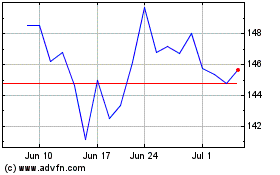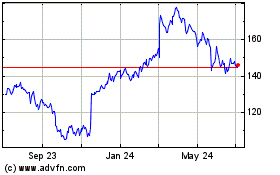Target Issues Profit Warning on Disappointing Holiday Sales -- 2nd Update
January 18 2017 - 10:50AM
Dow Jones News
By Khadeeja Safdar
Target Corp. warned of weak profits and sales in the critical
holiday period as the retail chain struggled to get shoppers to
visit its stores and relied on discounting to compete with
Amazon.com Inc. for online orders.
Sales at stores open at least a year fell 3% during November and
December. Target said online revenue jumped more than 30%, but
still accounted for just a fraction its total business, so overall
comparable sales are expected to fall for the quarter.
Digital gains were offset by "disappointing traffic and sales
trends in our stores" and web discounting ate away at the company's
profit margins, Chief Executive Brian Cornell said on
Wednesday.
Target's stock fell 4.7% to $67.69 in morning trading.
Mr. Cornell has been doubling down on physical stores as the
chain searches for an e-commerce strategy to compete with rivals
such as Amazon and Wal-Mart Stores Inc. The company has been
opening several smaller stores in urban areas and college towns to
attract younger shoppers who are increasingly buying items
online.
At a National Retail Federation event this week, Chief Digital
Officer Michael McNamara said he expected about 80% of business to
continue to take place in Target's stores. He also emphasized using
stores as fulfillment centers for online orders, which he said
provides a cost and lead-time advantage over Amazon.
The holiday season was a difficult one for many retail chains.
While industry sales rose about 4% from a year ago, according to
the NRF, customers were searching for discounts and much of the
growth came from online shopping where Amazon captures the lion's
share of sales.
Chains from department stores to mall-shops have warned of weak
results and announced plans to close stores. On Tuesday, Toys "R"
Us Inc. also posted a disappointing quarter, with same-store sales
down 2.5% in the U.S. for November and December.
Toys R Us CEO David Brandon said toy sales started to slow after
a promising results during the week of Black Friday, and that
rivals started promoting heavily to compensate, causing the company
to miss projections.
At Target, Mr. Cornell has been trying to reshape the company by
fixing up stores and improving its merchandise selection. Target
made investments to improve its in-store pickup area ahead of the
holiday season. The service was meant to lure last-minute shoppers
and help save money from delivery costs.
Target has also taken several steps to improve its grocery
business, such as adding organic items and investing in store
design. In recent months, the chain has been highlighting lower
prices to make it a more attractive destination for household
essentials.
Despite those efforts, comparable sales fell in the low single
digit range in the food and essentials category during the holiday
period. For electronics and entertainment products, that metric
declined in the high single digit range.
Overall, the company said comparable-store sales, which includes
its web business, are expected to fall as much as 1.5% in the
fiscal fourth quarter. The company had projected it could decline
as much as 1% or rise as much as 1% from a year ago.
Target lowered its profit targets for the fourth quarter, which
it expects to report on Feb. 28. Adjusted earnings are expected
between $1.45 and $1.55 a share, compared with prior guidance of
$1.55 to $1.75 a share.
Paul Ziobro and Anne Steele contributed to this article.
Write to Khadeeja Safdar at khadeeja.safdar@wsj.com
(END) Dow Jones Newswires
January 18, 2017 10:35 ET (15:35 GMT)
Copyright (c) 2017 Dow Jones & Company, Inc.
Target (NYSE:TGT)
Historical Stock Chart
From Mar 2024 to Apr 2024

Target (NYSE:TGT)
Historical Stock Chart
From Apr 2023 to Apr 2024
